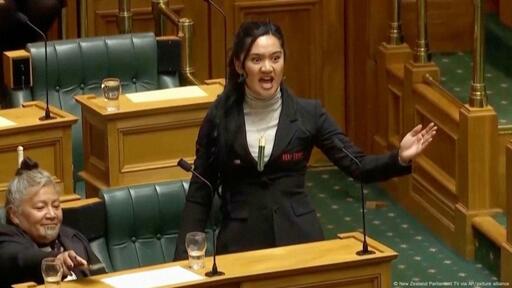The New Zealand Parliament has voted to impose record suspensions on three lawmakers who did a Maori haka as a protest. The incident took place last November during a debate on a law on Indigenous rights.
New Zealand’s parliament on Thursday agreed to lengthy suspensions for three lawmakers who disrupted the reading of a controversial bill last year by performing a haka, a traditional Maori dance.
Two parliamentarians — Te Pati Maori co-leaders Debbie Ngarewa-Packer and Rawiri Waititi — were suspended for 21 days and one — Hana-Rawhiti Maipi-Clarke, from the same party — for seven days.
Before now, the longest suspension of a parliamentarian in New Zealand was three days.



Shame. Wtf is wrong with your shitty shitty politics New Zealand?!!?! (Not an American, so I can call out anti-Indigenous politics)
Any decent human being can and should call out anti-Indigenous politics, no matter their nationality.
Yes, but I just don’t see anything resembling reconciliation happening in the US vis-a-vis Indigenous peoples there. Like, in the US there doesn’t appear to be any reconciliation, not even symbolic gestures like land acknowledgements at events, or meaningful involvement of Indigenous people in settler politics. Are any elected officials in the US also Indigenous, like - at all?
Your logic doesn’t make sense to me, you’re saying people in the US cannot spot and criticize injustices happening in other places because those same injustices are happening in their home country? What about the people who do criticize them locally? Or the natives who are affected by them locally?
Where are you from bud?
From the profile, Canadian. Oh the irony wanting to talk about the anti-indigenous practices
How is that relevant to who can and can’t discuss Indigenous rights though? Surely the more people in the world who care about Indigenous rights, the better.
To answer your question the US has about 5 out of 435 members, Canada has about 12 out of 343 members. New Zealand has about 33 out of 123 members which is obviously a much larger proportion of their total.
I will never understand why so many Canadians and Americans seem so unaware of one anothers’ Indigenous rights movements. You are neighbouring countries and some of your Indigenous nations are cross-border.